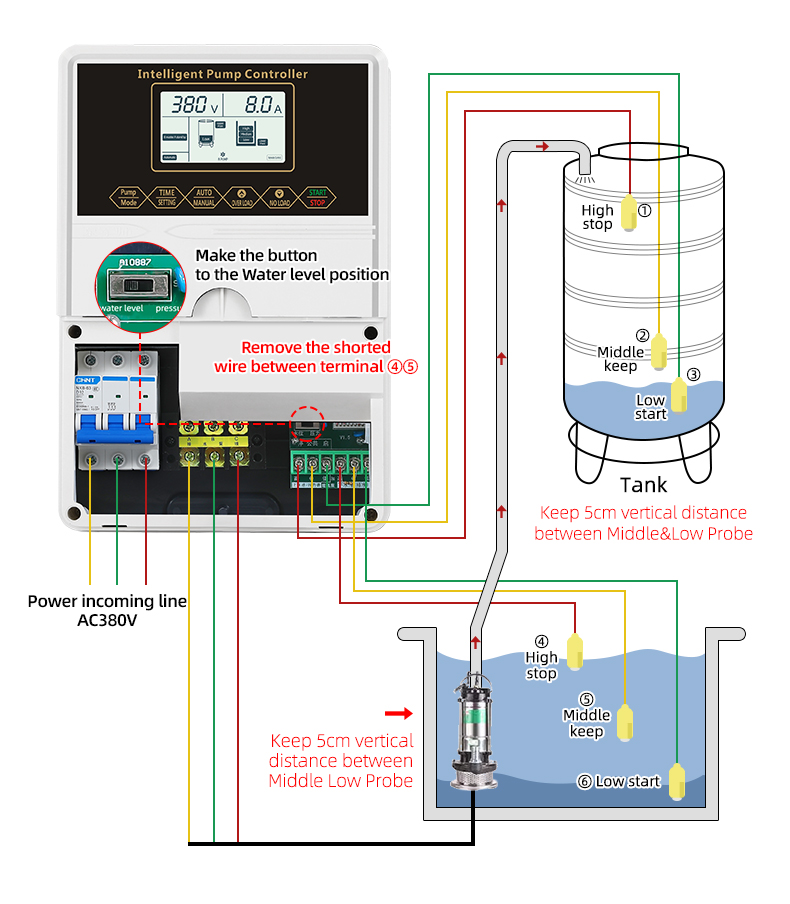In industries where every drop counts—like agriculture, construction, and manufacturing—efficient water control is more than just convenience; it's critical for operations. That's where an automatic water pump controller comes in. While the name may sound technical, this device quietly plays a huge role in improving water systems'efficiency, reliability, and even safety.
Instead of relying on manual operation, which often involves delays, errors, or human fatigue, an automatic controller takes over repetitive tasks and makes real-time decisions based on water demand. This results in smarter, faster, and safer pumping. Whether you're managing multiple tanks across a large property or overseeing a complex system in a factory setting, automation offers a level of consistency that manual systems simply can't match.
Table of Contents
What Does an Automatic Water Pump Controller Actually Do?
Why Replace Manual Pumping with Automation?
When Should You Consider Upgrading to an Automatic Pump Controller?
What Features Should You Look For in a Reliable Controller?
How Can the Right Controller Improve Operational Efficiency?
What Does an Automatic Water Pump Controller Actually Do?
An automatic water pump control box is a smart system that regulates the operation of water pumps without needing constant manual intervention. It monitors water levels using sensors—often in tanks, reservoirs, or wells—and then switches the pump on or off accordingly.
These controllers come with built-in logic that reacts to sensor data in real time. For example, when water in a tank drops below a pre-set level, the controller will start the pump, ensuring a continuous water supply. Once the tank is full, it turns the pump off, preventing overflow. Some models even include backup battery systems or remote alarms to signal unusual behavior.
This automatic adjustment extends pump life, improves energy usage, and reduces downtime due to unexpected failures. You also avoid issues like cavitation or overheating, which are common in systems without level protection.

Why Replace Manual Pumping with Automation?
If your current system relies on manual control or basic timers, you're likely facing at least one of these problems:
Inconsistent water supply during peak times
Pump failures due to running dry or overload
Wasted energy from pumps running longer than needed
Labor costs tied to constant monitoring and switching
Automation solves these problems by responding instantly to changes in water levels or system pressure. With a good automatic water pump controller, there's no need to guess whether the pump needs to run. This not only saves energy and labor but also reduces human error—which can lead to serious operational failures in high-demand environments.
Imagine a farm where the water supply to crops depends on someone manually turning a switch multiple times a day. Now compare that to a system that reacts automatically to changing moisture levels or tank capacities. The time, cost, and reliability difference is night and day.

When Should You Consider Upgrading to an Automatic Pump Controller?
Here are a few common scenarios where upgrading makes real sense:
Frequent pump maintenance due to dry runs or overheating
Erratic water levels causing inconsistent output
Growing operations with more tanks, lines, or pumping zones
Energy audits revealing pump inefficiencies
Staff shortages where fewer people manage multiple systems
If you're seeing any of these signs, it's worth evaluating your current setup. Upgrading to an automatic controller not only solves the immediate problems but also positions your operation for future scalability. Many businesses delay this investment thinking it's costly, but modern controllers are affordable and quick to install. In fact, most systems show a measurable improvement in performance and energy usage within just a few months.
Whether you're managing residential complexes or industrial treatment facilities, the switch to automation reduces the strain on your team while boosting reliability—something every operation can benefit from.
What Features Should You Look For in a Reliable Controller?
Not all controllers are built the same. Here's what to prioritize:
Dry run protection: Automatically cuts off power when water runs out
Overload protection: Shields motors from overheating or power surges
Sensor compatibility: Works with float, pressure, or ultrasonic sensors
Multi-voltage support: Compatible with AC/DC pumps in various settings
Clear indicators: LED or digital displays for easy status checks
Beyond these core features, consider options like manual override, delay timers, and remote access for diagnostics. High-end models may even integrate with SCADA systems or IoT platforms, providing real-time monitoring and alerts.
Build quality also matters. Look for rugged enclosures, waterproof ratings (like IP65 or above), and support for outdoor installations if needed. A reliable automatic water well pump controller should not only be smart but also durable—ready to withstand harsh environments without compromising performance.
How Can the Right Controller Improve Operational Efficiency?
The right automatic controller won't just "control" your pump—it will optimize it. This means:
Fewer interruptions due to pump damage or manual errors
Better planning because water usage becomes more predictable
Simplified maintenance with real-time alerts or diagnostics
Scalability if your system expands later
Over time, this optimization translates into real savings. Reduced energy bills, lower maintenance costs, and fewer emergency repairs all add up. Plus, with water being a limited resource in many areas, controlling usage more precisely can contribute to sustainability goals or compliance with regulations.
Many operations that have implemented automated pumping systems report smoother workflows, less downtime, and happier staff—because they're no longer constantly troubleshooting pump issues. It's a subtle change with a big ripple effect, improving not just the hardware but the human workflow surrounding it.

Conclusion
If you're still manually switching pumps or relying on outdated timers, it might be time to rethink your setup. An automatic water pump controller isn't just about saving time—it's about running smarter, using less energy, and protecting your infrastructure for the long haul.
Reliable brands like JNN offer robust, industrial-grade pump controllers built to handle demanding environments. Whether you're managing groundwater, tanks, or pressurized systems, upgrading to automation might be the best water decision you'll make this year.

























